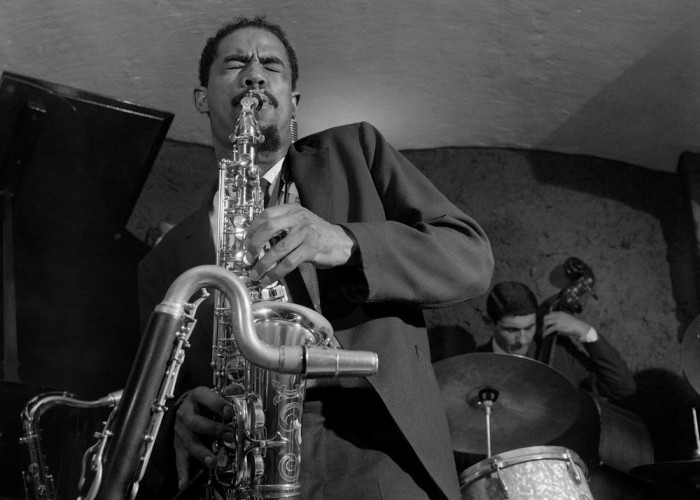Jan 13, 2026 2:09 PM
More Trump-Kennedy Center Cancellations
The fallout from the renaming of the John F. Kennedy Center for the Performing Arts to include President Donald…

Recordings that make up Musical Prophet: The Expanded 1963 New York Studio Sessions sat in a Long Island home, untouched, for decades.
(Photo: Jean-Pierre Leloir)In 2014, pianists Aki Takase from Japan and Alexander von Schlippenbach from Germany released So Long, Eric! (Intakt), featuring European interpreters of Dolphy’s music. Among them was drummer Han Bennink, who joined Dolphy in his quartet on Last Date, recorded in concert at a radio studio in Hilversum, the Netherlands, just 27 days before the multi-instrumentalist died.
If he were alive, Dolphy might very well be surprised at all the attention being lavished on him, given the difficulty parts of the jazz establishment had in understanding him during his lifetime. That failure reveals itself in the elementary nature of the questions the late critic Leonard Feather asked of Dolphy in an undated interview, an audio excerpt of which appears at adale.org, a website operated by neuroscientist Alan Saul.
Feather’s questions largely revolve around the move away from improvisation based strictly on harmonic progressions. Feather, with his mellifluous British intonation, asks: “If your foundation is not a chord sequence, which is what the traditional basis of jazz was, then what is the foundation?”
Dolphy, in earthier tones, replies: “Some things you play are not based on chords, they’re based on freedom of sound. You start with one line and you keep inventing as you go along.”
The gap in perspective remains wide throughout the excerpt, with little apparent prospect for a narrowing. Though Dolphy always showed great respect for all jazz traditions—the anthropomorphic cries he wrung from his horns consciously harked back to the early days of jazz in New Orleans—those who knew him said he was too iconoclastic to operate within the straight and narrow strictures of jazz convention.
“He was constantly bending,” Smith said. “That’s what got him into so much difficulty. You upset the natural thing, people get upset.”
These days, when so much of Dolphy’s vocabulary has been absorbed into the jazz lexicon, it seems hard to grasp what the upset was all about. While no one knows how he would have evolved, Davis said that, at the time of his death, Dolphy was working on music for string quartets. He would have been well prepared for such a task: The vivid intimations of Third Stream stylings on Dolphy’s 1960 album Out There, with Ron Carter on cello and George Duvivier on bass, suggest that the string quartet would have become another in the varied box of tools with which he reached out to new groups of listeners in fresh ways.
“He certainly knew how to put the music across,” Davis said. DB

Belá Fleck during an interview with Fredrika Whitfield on CNN.
Jan 13, 2026 2:09 PM
The fallout from the renaming of the John F. Kennedy Center for the Performing Arts to include President Donald…

Peplowski first came to prominence in legacy swing bands, including the final iteration of the Benny Goodman Orchestra, before beginning a solo career in the late 1980s.
Feb 3, 2026 12:10 AM
Ken Peplowski, a clarinetist and tenor saxophonist who straddled the worlds of traditional and modern jazz, died Feb. 2…

The success of Oregon’s first album, 1971’s Music Of Another Present Era, allowed Towner to establish a solo career.
Jan 19, 2026 5:02 PM
Ralph Towner, a guitarist and composer who blended multiple genres, including jazz — and throughout them all remained…

Rico’s Anti-Microbial Instrument Swab
Jan 19, 2026 2:48 PM
With this year’s NAMM Show right around the corner, we can look forward to plenty of new and innovative instruments…

Richie Beirach was particularly renowned for his approach to chromatic harmony, which he used to improvise reharmonizations of originals and standards.
Jan 27, 2026 11:19 AM
Richie Beirach, a pianist and composer who channeled a knowledge of modern classical music into his jazz practice,…